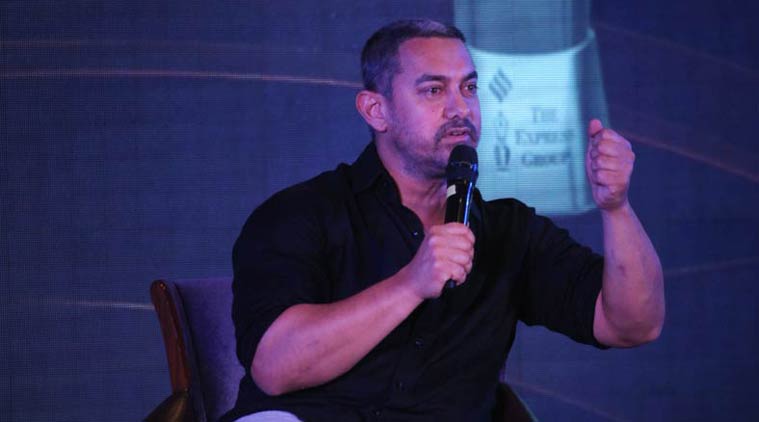
NEW DELHI (TIP): Bollywood actor Aamir Khan spoke out earlier this week, at the Ramnath Goenka Excellence in Journalism Awards in New Delhi, against what he described as a rising tide of religious intolerance in India.
Khan said in the event, “(Wife) Kiran and I have lived all our lives in India. For the first time, she said, should we move out of India? That’s a disastrous and big statement for Kiran to make to me.”
“She fears for her child. She fears about what the atmosphere around us will be. She feels scared to open the newspapers everyday. That does indicate that there is a sense of growing disquiet.”
“You feel why this is happening, you feel low. That sense does exist in me.”
Khan meanwhile applauded the number of Indian writers, scientists and filmmakers who have since returned awards bestowed upon them by the country — an act of protest against, as biologist P.M. Bhargava phrased it, “the government’s attack on rationalism.”
“For creative people, to voice what they feel is important. A number of creative people – historians and scientists – have increasingly had a certain feeling that they feel they need to express. One of the ways of expressing their dissatisfaction or disappointment is to return awards.”
He said: “As long as you don’t resort to violence, all individuals have a right to protest and they can protest in any manner they feel is right”.
“This is certainly a way to protest for creative people.”
Earlier this month fellow superstar Shah Rukh Khan also spoke out against what he called “extreme intolerance” in India.
A movement that began with writers returning state awards has spread to scientists, historians and filmmakers. They have cited the killing of rationalists M M Kalburgi and Govind Pansare, as well as the lynching of a man over suspicions he consumed beef, as examples of rising intolerance in the country.
Some excerpts from the interview.
Anant Goenka : Aamir, are you agreeing with the protest or do you think it’s called for… do you think it is premature?
Aamir: Well, I think, if I am not mistaken there are so many people in this room who are much more knowledgeable than me so I am feeling intimidated to speak in front of all of you. But my understanding is that a lot of people from the creative fraternity are protesting because of the growing discomfort they felt or the growing atmosphere of intolerance that they felt around them… growing sense of insecurity and disappointment with that, and as a result that was their way of showing that they are not happy with the situation.
As an individual myself, as a part of the country, as a citizen, we read in newspapers what’s happening and certainly I have also been alarmed. I can’t deny that I am alarmed.. by a number of incidences. For any society it is very important to have a sense of security. I mean there will be acts of violence in world for different reasons. But for us as Indians, as a part of society to have a sense of security… two-three things are very important, I feel. One is sense of justice. If there is a wrong step that anyone takes, then a correct justice is what is required. Common man should feel that justice will be done. That’s what gives a sense of security. The second and very important sense of security is the people who are our elected representatives – people who we select to look after us for five years if at state level or Centre. When people take law in to their hands and when there is a sense of insecurity, we look upon these people to take a strong stance, make strong statements and speed up the legal process to prosecute cases. When we see it happening there is a sense of security but when we don’t see that happening there is a sense of insecurity. So it does not matter who the ruling party is. It’s happened across ages. On television debates, we see where one political party, in this case, the BJP which is ruling right now, is accused of various things. They said, ‘But what happened in 1984?’. But that doesn’t make right what’s happening now. What happened in ‘84 was disastrous and horrendous. At other times also, through ages, whenever there is a violent act, when an innocent person is killed, be it one or a large number, that’s very unfortunate. And these unfortunate moments are the ones when we look towards our leaders to take a strong step. Make statements that are reassuring to the citizens.
The Indian Panorama analyst shares a similar opinion and maintains that the storm over actor Aamir Khan’s statement on ‘rising intolerance’ needs to be understood against the backdrop of the recent political temperature.
There is nothing wrong with what Aamir said, or what his wife asked him, given the nature of divisive politics being played in India, where such issues are drummed up by opposition parties and played down by Government.
The common sentiment within the dissent is a belief that the government of Prime Minister Narendra Modi, who leads the right-wing Bharatiya Janata Party (BJP), has fostered a climate of discrimination against India’s religious minorities.
Prime Minister Narendra Modi is known for his “Hindutuva” ideology and has maintained a studied silence on growing intolerance. His party members have taken his continued silence on the issue as his approval and continue to fuel anti-minority sentiments.
It is a dangerous trend, one which may create an atmosphere of violence which ultimately could destabilize the nation. For a country of 1.25 billion people and their multiple diversities, insecurities and concerns involving caste, religion, and ethnicity, being secular & tolerant needs to be a way of life.





Be the first to comment